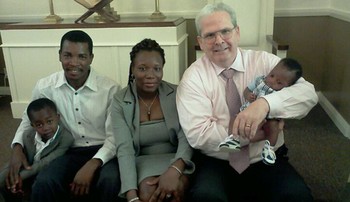Sojourners recently sought the 50 “Greatest Social Justice Leaders We’ve Never Heard Of” to participate in “The Summit” at Georgetown University. Those leaders included Columbia Theological Seminary graduate Bill Jenkins (D.Min. ’85).
Founded in 1970 by Jim Wallis, Sojourners is the Washington, D.C., community of leaders who care about changing the world through faith and justice. The Summit was their inaugural gathering of leaders from across the globe on issues affecting poverty, immigration, racial justice, women and girls rights, and the environment.
Jenkins, 66, who grew up in rural Mississippi during the Civil Rights Movement, seemed unlikely to become either an urban minister or social justice advocate. But the United Methodist minister is setting a new model for how struggling urban churches may transition into new life and mission as urban ministry centers. He is also developing a revolutionary way churches, charities and social agencies can work together to meet the needs of the hungry, homeless, helpless and hurting.
From church to urban ministry center
In 1999, Bill Jenkins became pastor of Christ United Methodist Church in the heart of San Diego. “Like many urban churches, each year we became a bit smaller, grayer, and had less money in the offering plate,” he said. In 2006, with church closure inevitable, he challenged the remaining congregation to transition from a traditional church into an “urban ministry center”.
It took a bit of convincing, but with the approval of his Bishop, Christ UMC closed in 2011. Jenkins retired from the pulpit. Immediately, with no clear blueprint, he set out to create Christ Ministry Center.
Today, Christ Ministry Center touches the lives of more than 1,000 individuals each week. A dozen ecumenical, multi-ethnic congregations share worship space in the large building. In addition, a dozen charities and ministries focused on serving the hungry, thirsty, naked, sick, prisoners and immigrants (Matthew 25:35) call Christ Ministry Center home.
That includes a grocery distribution, women’s prison ministry, satellite wellness clinic, outreach to battered women, orphans, and a safe haven for refugees who have at times even lived in the former church building.
Jenkins stated, “Two Methodist Bishops expressed Christ Ministry Center could serve as a model for how dying inner-city churches may find renewal in urban ministry. But it has to be more than just keeping the doors open. It must involve following Christ’s example and getting your hands dirty in meeting the spiritual and physical needs of the poor.”
The Fount of Blessings
Jenkins soon learned the biggest problem in urban ministry is matching those in need with the resources provided by churches and charities. He discovered an abundance of supplies and services being offered for the poor. But finding and sharing information about those resources was almost non-existent.
“Two churches just blocks apart were unaware of what each other are doing to help those in need,” Jenkins said. “That leads to inefficiency, ineffectiveness, duplication of efforts, and failed opportunities in achieving our mission in helping the helpless.”
That is when he got a vision of creating a free website that allows both those providing help and those seeking help to find the basics they are looking for. Calling upon his tri-vocational experience as a technology manager, graduate school professor and ordained minister,
Jenkins created The Fount of Blessings, a central directory of hundreds of resources available in San Diego from churches, charities and social agencies to assist the poor.
Using metaphors from the 1757 A.D. hymn, “Come Thou Fount,” Jenkins explained “‘Founts’ are churches, charities or social agencies providing services, and ‘Streams of Mercy, never ceasing’ are the services each Fount provides, such as food, clothing and shelter. Even a small church may use The Fount to become a ‘virtual ministry center’ connecting those in need with these resources nearby.”
A short video at www.myfount.com explains how The Fount of Blessings works.
“The Fount has the potential to revolutionize the way organizations can more easily and effectively work together to direct those in need to almost any resource available in their area,” Jenkins explained.
Going nationwide
The free, ecumenical, non-profit website is meeting wide approval among clergy, social workers, non-profit managers, and government leaders in San Diego.
As the pilot project in San Diego nears completion, Jenkins plans to take The Fount nationwide as a smartphone app called “AbundantHELP.” He envisions the day when ministers, social workers and those seeking help will be able to find the closest food, clothing, shelter or two dozen other services nearest them with the click of a finger.
“If it works in San Diego, it will work in New York, Miami, Seattle, Los Angeles and all points between,” he added
Jenkins concluded, “In 1984, I wrote my doctoral dissertation at Columbia Theological Seminary on the use of technology in the church. Technology has changed dramatically since then. But my thesis that churches should embrace technology remains more true today than when I wrote it. As I enter the final chapter of my ministry, it gives me great joy to combine technology and theology in providing a way for us all to do a better job in helping those in need.”

